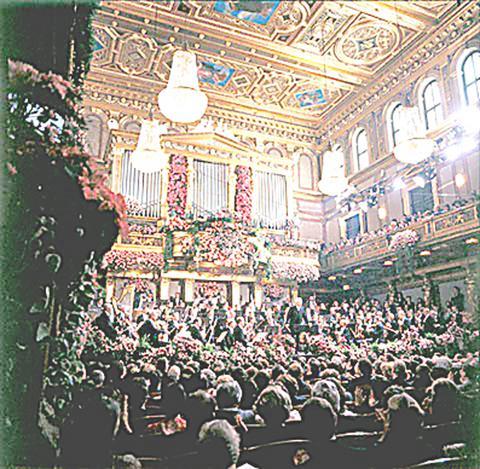Whatever are we to say about the Vienna Phil playing in Taipei this weekend with top ticket prices of NT$7,200? On the one hand, they're one of the three or four best orchestras in the world. On the other, think of the CDs you could get for that money! You can listen to those over and over again, but with these concerts it's two hours-worth of sound in your ears, and then it's all over.
Ticket prices are a lot less in Taichung, incidentally, where the orchestra plays tonight. As with everything else, you pay your money -- albeit a great deal more in this case than usual -- and you take your choice.
And then there's Zubin Mehta, who will conduct. Born in India of Parsee lineage (his father founded India's first Western-style orchestra in 1935), Mehta is currently in charge of the Israel Philharmonic, and before that ran the New York and Los Angeles Philharmonics.

PHOTO COURTESY OF UNIVERSAL
All the world's top conductors want to work with the Vienna Philharmonic. After all, conductors can make no music alone, and to show themselves at their best they need to work with the best instrumentalists. Simon Rattle, Nikolaus Harnoncourt, Bernard Haitink, Pierre Boulez, Valery Gergiev, Daniel Barenboim and Riccardo Mutti have all conducted the Vienna Philharmonic recently -- the orchestra, most unusually, has no resident maestro of its own.
Another strange feature of this line-up used to be that it contained no women, apart from a token harpist. For some reason the harp is an instrument judged only playable by a woman. But from 1997 equal opportunity was finally granted, and his weekend we may see a small number of women -- one local expert suggests two or three -- among their number.
The orchestra's Taiwan programs are generally unadventurous. Saturday's Taipei concert will culminate in Mahler's lyrical Symphony No. 1, with Haydn's Sinfonia Concertante and Nikolai's Merry Wives overture beforehand. Sunday will see Beethoven's Symphony No. 3 (Eroica), preceded by Haydn's Trumpet Concerto and Beethoven's Leonora Overture No. 3. This second program is the one to be played in Taichung.
The Vienna Philharmonic will play tonight in Taichung and tomorrow and Sunday at the National Concert Hall Taipei.

May 11 to May 18 The original Taichung Railway Station was long thought to have been completely razed. Opening on May 15, 1905, the one-story wooden structure soon outgrew its purpose and was replaced in 1917 by a grandiose, Western-style station. During construction on the third-generation station in 2017, workers discovered the service pit for the original station’s locomotive depot. A year later, a small wooden building on site was determined by historians to be the first stationmaster’s office, built around 1908. With these findings, the Taichung Railway Station Cultural Park now boasts that it has

The latest Formosa poll released at the end of last month shows confidence in President William Lai (賴清德) plunged 8.1 percent, while satisfaction with the Lai administration fared worse with a drop of 8.5 percent. Those lacking confidence in Lai jumped by 6 percent and dissatisfaction in his administration spiked up 6.7 percent. Confidence in Lai is still strong at 48.6 percent, compared to 43 percent lacking confidence — but this is his worst result overall since he took office. For the first time, dissatisfaction with his administration surpassed satisfaction, 47.3 to 47.1 percent. Though statistically a tie, for most

Wooden houses wedged between concrete, crumbling brick facades with roofs gaping to the sky, and tiled art deco buildings down narrow alleyways: Taichung Central District’s (中區) aging architecture reveals both the allure and reality of the old downtown. From Indigenous settlement to capital under Qing Dynasty rule through to Japanese colonization, Taichung’s Central District holds a long and layered history. The bygone beauty of its streets once earned it the nickname “Little Kyoto.” Since the late eighties, however, the shifting of economic and government centers westward signaled a gradual decline in the area’s evolving fortunes. With the regeneration of the once

In February of this year the Taipei Times reported on the visit of Lienchiang County Commissioner Wang Chung-ming (王忠銘) of the Chinese Nationalist Party (KMT) and a delegation to a lantern festival in Fuzhou’s Mawei District in Fujian Province. “Today, Mawei and Matsu jointly marked the lantern festival,” Wang was quoted as saying, adding that both sides “being of one people,” is a cause for joy. Wang was passing around a common claim of officials of the People’s Republic of China (PRC) and the PRC’s allies and supporters in Taiwan — KMT and the Taiwan People’s Party — and elsewhere: Taiwan and